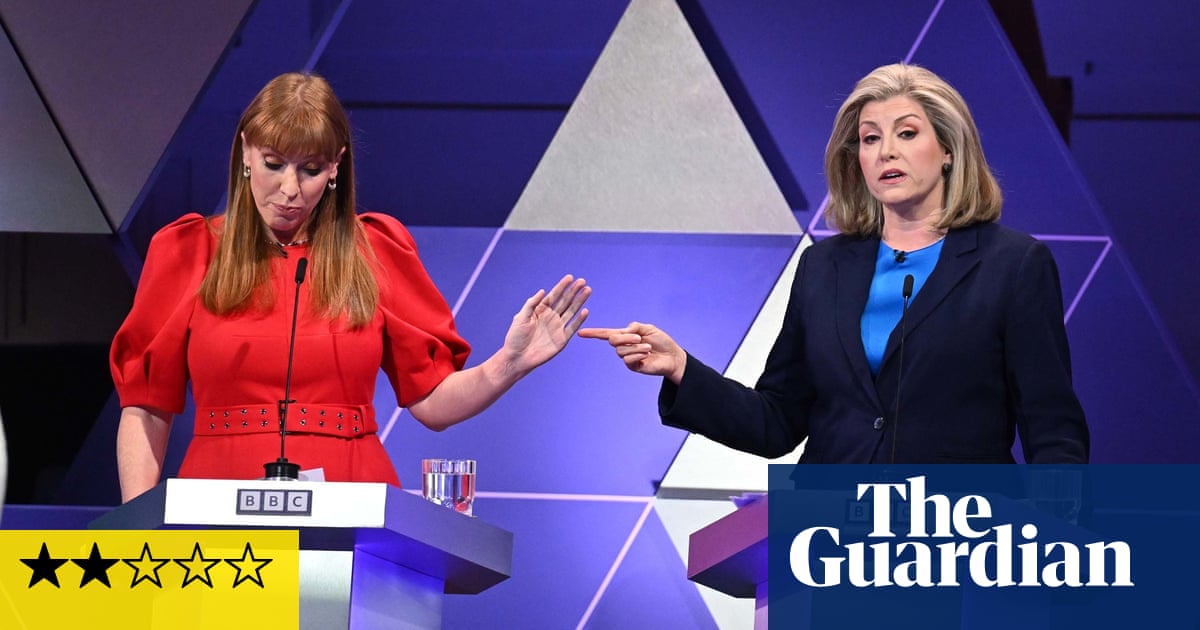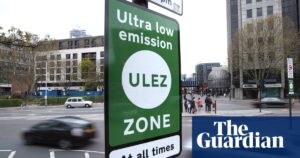
Emerging as the winner of a seven-way brawl is never easy and, in the second of this election’s televised debates, nobody won. Either because of the strictures placed on them by their parties’ political situations or because they just didn’t cope very well with the format, every participant struggled.
Keir Starmer and Rishi Sunak’s scrappy goalless draw two nights earlier had been dominated by one prepared line: a dubious Tory contention about Labour raising taxes. But as the lights went up at the BBC Radio Theatre at Broadcasting House in London, revealing seven lecterns in a tight V formation, one talking point was at the front of every viewer’s mind. The day’s discourse had been dominated by the prime minister being forced to apologise for leaving a D-day commemoration ceremony early and, perhaps fearing that delaying the inevitable would leave the audience impatiently drumming their fingers, the BBC let the audience get straight to business with a question from a veteran’s son about maintaining the armed forces.
Then came a moment of dissonance, as Labour’s Angela Rayner, making a halting, robotic start, answered the question without mentioning Sunak. Daisy Cooper of the Liberal Democrats, projecting assertively to the back row like a teacher or amateur dramatics veteran who doesn’t require a microphone, did the same. By the time the leader and indeed owner of Reform UK, Nigel Farage, took his turn, his raising of D-day felt a little crow barred in.
The Tory politician handed the turd sandwich of having to defend their leader was Penny Mordaunt, who was in full national-tragedy gravity mode as she solemnly intoned that the prime minister’s actions in Normandy had been “very wrong”. Soon, though, she was back, firing out preprepared attack lines. The tax claim was to reappear later, but the defence-themed question brought out another carefully rehearsed accusation about Labour having not always fully supported the idea of helping to end humanity by participating in global thermonuclear war: “If your foe does not believe that you will use these weapons, the deterrent is gone.” Mordaunt somehow used this atomic attack line again in answer to the night’s second question, about the NHS.
Rayner had perhaps the most impossible, or simply pointless, task, of all the seven talking heads. If it didn’t really matter what Mordaunt said because the Tories have already lost, Labour having as good as won the election meant the same applied to Rayner. She seemed grateful for a slanging match with Mordaunt giving her something to say. The drawing of lots that determined where the speakers stood had put the pair together: Rayner often turned away from the other five participants and went at it with Mordaunt until the show’s presenter, Mishal Husain, told them to stop. Carla Denyer, of the Green party, got the only proper laugh of the evening for her reaction to one particularly cacophonous burst of cross-talk: “That was terribly dignified, wasn’t it?”
Denyer ought to have flourished here, but her crack at Rayner and Mordaunt’s expense was one of the few occasions when she successfully managed to seem like she was confidently being herself. Almost always reading her answers from notes and admittedly not helped by frequent interruptions from Husain, her focus on individual policy proposals rather than revolutionary political ideas saw her fall into the trap of sounding small-time, a junior partner in the evening’s enterprise.
Stephen Flynn of the Scottish National party and Rhun ap Iorwerth of Plaid Cymru were also there, in theory, to freshen and expand the debate. They helped Denyer out by making similar points more pithily, but couldn’t ever quite overcome the fundamental difficulty of addressing the whole of the UK while only actually caring about the votes of their own nation. Flynn, fluent but a shade too intense, brought his every answer straight back to Scotland, which clanged in the context of what the speaker before him had said; Iorwerth had a more rounded everyman quality but still didn’t commit to much discourse that wasn’t confined to Wales.
after newsletter promotion
On the fringe of the action was Nigel Farage, who might, like Denyer, have expected to clean up, since his central point about the British political system being broken is a powerful one, even if his proposed alternative is horrific. As usual he was the most confident speaker in attendance – but if the reaction of the cross-section of society making up the studio audience is anything to go by, no longer being able to argue for Brexit has hamstrung him. His general scapegoating of migrants didn’t land, and a bizarrely outmoded and irrelevant rant about windfarm subsidies suggested that his gift for mood-reading and rabble-rousing has deserted him, or was always a myth. His only consolation is that, in this hubbub of rote talking points and clashing agendas, everyone found it hard to make themselves heard.
Source: theguardian.com


















